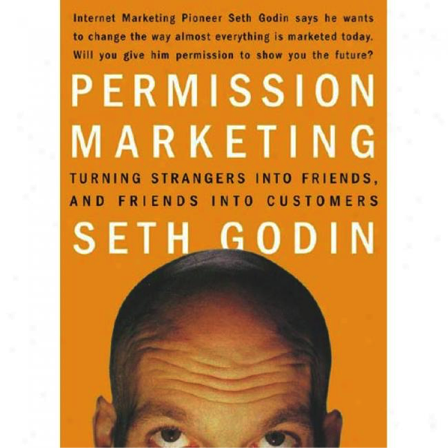Last week we talked the method of permission marketing. This week, I will discuss a few caveats that will help you use Permission Marketing more effectively.
Caveat #1 – Ask for a First Date, Not Marriage
One of the most common mistakes that marketers make is to focus too much on closing the sale. Godin likened this approach to proposing marriage to a stranger shortly after the introduction.
In contrast, the permission marketer is just asking for a first date. This reduces the pressure and opens the door to an ongoing relationship.[i] Then, the permission marketer engages, teaches, and explains how to solve his date’s problems. Along the way, the permission marketer deepens the relationship and gains increasing levels of trust and permission.[ii]
Caveat #2 – Create Value Over Time
Godin wrote:
Creating value through interaction is far more important than solving a consumer’s problem in thirty seconds. So if you can get the right to communicate with permission, you’ve just obtained the right to use frequency. And that, as we’ve seen, is the holy grail of marketing.[iii]
Why is frequency so important? Godin explained: “Trust comes from frequency. But before frequency turns into sales, it turns into permission. Permission to communicate, permission to customize, permission to teach. And permission is just a step away from trust.”[iv]
Caveat #3 – The Five Levels of Permission
Godin outlined five levels of permission. Ideally you want to move your customers from the lowest levels to the highest level.
- At level 0, you are dealing with spam. There is no permission involved. You are annoying and mostly ignored.
- At level 1, you have situational permission. The customer has asked about a product and you have permission to direct him to that which he is looking for, but you do not have permission to go further. This happens, for example, when you ask a clerk for assistance.[v]
- At level 2, the company enjoys brand trust. Toyota and Maytag enjoy brand trust. The customer may not care about the model of the car or washing machine as much as they take comfort in the knowledge that their purchase will be well built.
- At level 3, you enjoy a personal relationship with your customer. Communication is flowing freely, but there is one difficulty. Godin explained that personal relationships are hard to leverage.
- At level 4, the customer is engaged in an incentive program that brings him back and keeps him engaged. Godin used the example of green stamps, but you can probably think of others.[vi] I get points for using my incentive card at Panera Bread and Chick-Fil-A. I am happy to get free food and, as a consequence, their contacts more friendly than spammy.
- At level 5, you have achieved the pinnacle of permission marketing. Godin explained:
The highest level of permission is called ‘intravenous.’ This is what you’ve got going when you’re in the intensive care unit with a needle in your arm and a bag of medicine dripping into your veins.
Your doctor has your written permission to inject just about anything he wants into your IV bag. Not only can he select and administer the drug, but he can then charge you for the treatment and fully expect you’ll pay for it.
A marketer who has achieved intravenous permission from his customer is making the buying decisions on behalf of the customer. The privilege is huge.[vii]
Caveat #4 – Permission Means Real Permission
Permission means that they have explicitly agreed to hear from you again. You cannot trick them into permission with a hidden check box or they will treat your future messages like spam. “Be personal. Be relevant. Be specific. And always be anticipated. Anticipation, of course, is even better than expectation. Without surprising the consumer, gradually raise the level of permission you extract.”[viii]
Elsewhere Godin wrote: “Caution! The opt-in step, the first one, is tricky, expensive, and slow. Because of this, many marketers may decide to skip it and just rent or buy a list of email addresses. This is a bad idea.”[ix] Get real permission. Make it clear. Then proceed to woo your customer.
Caveat #5 – Permission is Non-Transferable
Godin explained that permission is part of a relationship. True permission cannot be purchased by buying a list of potential customers. Nor can it be stolen. He offered the following examples to prove the ideas.
First, imagine that you lost your phone and a stranger stole it. You had 2,000 contacts, but those contacts are no good to the thief. He cannot call anyone on that list and enjoy the advantages you have cultivated.[x]
Next imagine your date’s or spouse’s surprise if when she shows up for a date, you send a stand-in.[xi] That won’t work because that relational permission was granted to you, not to the person you hired to cover you.
It works the same way with your customers.
Caveat #6 – Be a Teacher, Not a Salesman
The Gallop organization found that when Americans are asked about the most and least respected professions, salesmen regularly round out the bottom rows (otherwise, that honor would be held by congressmen), while teachers are regularly in the top tier.[xii] Why is this?
Salesmen have bad reputations because some of them employ high-pressure sales tactics and repeat the mantra: ABC: ALWAYS BE CLOSING. They focus on what they can get rather than how they can add value.
But teachers do the reverse. They always try to make us better. They want us to learn and grow. A good salesman will act like a teacher.
What About You?
Do you see the difference between hard-selling a customer and asking for permission?
At this point, you might object that you have to hard-sell because you are on commission and your kids like to eat. That is fair, but perhaps you should start changing your approach. How many customers have you lost because they could smell the desperation?[xiii] When you begin teaching rather than selling, how many new customers will you convert that you otherwise would have scared away?
References
[i] Godin, S. (1999). Permission marketing: Turning strangers into friends and friends into customers. New York: Simon & Schuster. (p. 45).
[ii] Godin, S. (1999). Permission marketing: Turning strangers into friends and friends into customers. New York: Simon & Schuster. (pp. 46-47).
[iii] Godin, S. (1999). Permission marketing: Turning strangers into friends and friends into customers. New York: Simon & Schuster. (p. 93)
[iv] Godin, S. (1999). Permission marketing: Turning strangers into friends and friends into customers. New York: Simon & Schuster. (p. 96).
[v] Godin, S. (1999). Permission marketing: Turning strangers into friends and friends into customers. New York: Simon & Schuster. (p. 127)
[vi] Godin, S. (1999). Permission marketing: Turning strangers into friends and friends into customers. New York: Simon & Schuster. (pp. 105-106).
[vii] Godin, S. (1999). Permission marketing: Turning strangers into friends and friends into customers. New York: Simon & Schuster. (p. 98).
[viii] Godin, S. (1999). Permission marketing: Turning strangers into friends and friends into customers. New York: Simon & Schuster. (p. 75).
[ix] Godin, S. (1999). Permission marketing: Turning strangers into friends and friends into customers. New York: Simon & Schuster. (p. 159).
[x] Godin, S. (1999). Permission marketing: Turning strangers into friends and friends into customers. New York: Simon & Schuster. (p. 121).
[xi] Godin, S. (1999). Permission marketing: Turning strangers into friends and friends into customers. New York: Simon & Schuster. (p. 131).
[xii] Gallup (2017). 2017 Honesty and Ehics. Gallup Organization. Retrieved from https://news.gallup.com/poll/224645/2017-honesty-ethics.aspx?g_source=link_newsv9&g_campaign=item_224639&g_medium=copy
[xiii] While this concept is not exclusive, Godin talks about it in The Icarus Deception.
______________

Dr. Darin Gerdes is a Professor of Management in the College of Business & the Director of Educational Technology at Charleston Southern University. All ideas expressed on www.daringerdes.com are his own.
This post was originally created for Great Business Networking (GBN), a networking organization for business professionals where Dr. Gerdes is the Director of Education.

